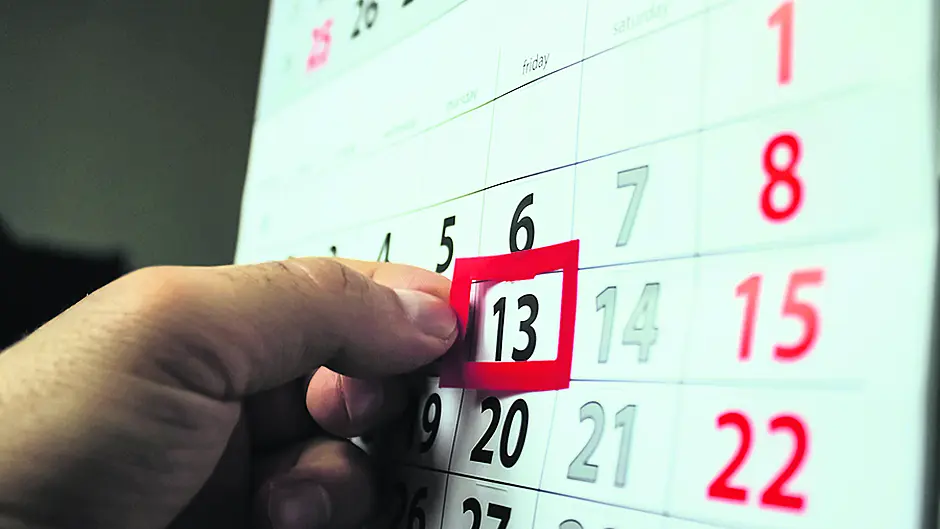Are you superstitious?
Your Mental Health with Linda Hamilton, Cognitive behavioural therapist
ARE you superstitious? Would you feel uncomfortable if you walked under a ladder or lost a lucky charm you carried around with you? Or perhaps you think there’s probably no truth to these old notions, but there’s no harm in heeding them anyway?
Is this true? Are these just harmless quirks? Or can holding onto superstitious beliefs get you into trouble?
Certainly, many people are superstitious. Most buildings around the world don’t have a 13th floor. In China, the number eight is viewed as a lucky number; as a result, the country’s tallest skyscraper is 88 floors high and the Beijing Olympics began at 8.08pm on August 8th, 2008.
Touch wood!
Anyone familiar with University College Cork (UCC) will have heard the old warning that you’ll fail your exams if you walk across the quadrangle on the campus. A UK survey carried out by psychology professor Richard Wiseman found superstitious behaviour and beliefs to be “surprisingly high, even among those with a scientific background”, with 77% of people saying they were at least a little superstitious and 42% saying they were very or somewhat superstitious.
The survey found touching wood to be the most popular superstition, followed by crossing fingers, avoiding ladders, not smashing mirrors, carrying a lucky charm and having superstitious beliefs about the number 13.
Superstitious people, the survey found, “tend to worry about life”, have a “strong need for control” and a “low tolerance for ambiguity”. For example, the survey found 50% of worriers were very or somewhat superstitious, more than twice as high as non-worriers.
Similarly, 42% of people who indicated a high need for control were superstitious, almost twice as high as people who felt a low need for control.
Other studies confirm the link between superstition and a need for control or reassurance. Indeed, women tend to be much more superstitious than men and Wiseman suggests this may well be due to women having lower self-esteem and less perceived control over their lives.
Not harmless
Is this harmless? Could superstition even be a good thing, if it helps people to feel a little less anxious and a bit more secure? I don’t think so, for a variety of reasons.
Firstly, while superstitious acts may temporarily diminish anxious feelings, they can also maintain and worsen them. Superstitious acts can become a habit, so much so that the person feels anxious when they are unable to perform them.
Secondly, superstitions are generally driven by a need for control and certainty. For many people, some certainty – even if illusory – is better than no certainty at all. However, intolerance of uncertainty gets you into trouble in all sorts of ways.
Intolerance of uncertainty tends to be at the heart of anxiety disorders (particularly obsessive-compulsive disorder, or OCD, which is often characterised by very superstitious thinking). In truth, life is an inherently uncertain business. Good mental health requires accepting that fact, of saying “I don’t know for sure and I’m fine with that. Life would be boring if everything was certain”.
Thirdly, superstitious beliefs can lead to bad decisions. For example, research indicates problem gamblers are more likely to believe that they can get lucky, thereby contributing to their gambling problem.
Gambling aside, worriers often say if they don’t worry about something, there is a greater chance of the feared event happening – an essentially superstitious thought that causes needless suffering.
Finally, cognitive behavioural therapy (CBT) makes the case that we are best served by striving to become personal scientists, by being open and calmly weighing up evidence that both supports and contradicts our beliefs. Superstitious behaviour is the opposite of this.
Superstition means going with your gut, going with your feelings, but feelings aren’t facts. Your feelings can lead you astray.
Ask yourself: is it good that you get spooked because of something you read in an astrology column? Is it good to let your mood be dictated by things that deep down, you know aren’t true?
My advice? Walk under that ladder; uncross your fingers; get rid of the lucky charm. Seek out discomfort; it will make you stronger.
Linda Hamilton is a Kinsale-based cognitive behavioural therapist.
If you would like to get in touch with her, call 086-3300807
For more information, go to www.kinsalecbt.com
Like and follow ‘KinsaleCBT’ on Facebook






